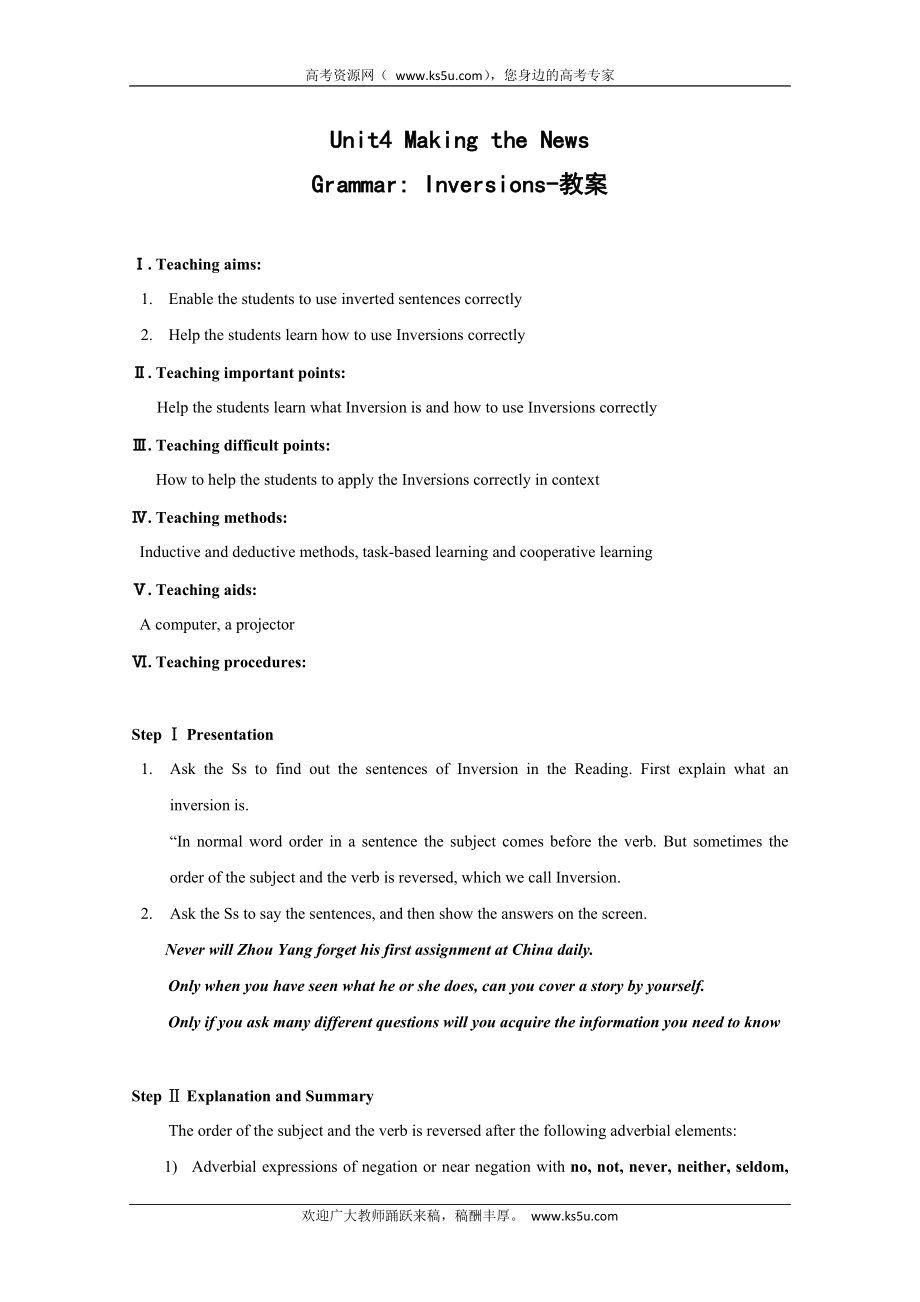《英語(yǔ):unit4 making the newsgrammar教案(新人教版必修5)》由會(huì)員分享��,可在線閱讀�,更多相關(guān)《英語(yǔ):unit4 making the newsgrammar教案(新人教版必修5)(5頁(yè)珍藏版)》請(qǐng)?jiān)谘b配圖網(wǎng)上搜索。
1����、高考資源網(wǎng)( )�,您身邊的高考專(zhuān)家
Unit4 Making the News
Grammar: Inversions-教案
Ⅰ. Teaching aims:
1. Enable the students to use inverted sentences correctly
2. Help the students learn how to use Inversions correctly
Ⅱ. Teaching important points:
Help the students learn what Inversion is and how to use Inver
2、sions correctly
Ⅲ. Teaching difficult points:
How to help the students to apply the Inversions correctly in context
Ⅳ. Teaching methods:
Inductive and deductive methods, task-based learning and cooperative learning
Ⅴ. Teaching aids:
A computer, a projector
Ⅵ. Teaching procedures:
Step
3�、Ⅰ Presentation
1. Ask the Ss to find out the sentences of Inversion in the Reading. First explain what an inversion is.
“In normal word order in a sentence the subject comes before the verb. But sometimes the order of the subject and the verb is reversed, which we call Inversion.
2. Ask the Ss t
4、o say the sentences, and then show the answers on the screen.
Never will Zhou Yang forget his first assignment at China daily.
Only when you have seen what he or she does, can you cover a story by yourself.
Only if you ask many different questions will you acquire the information you need to k
5��、now
Step Ⅱ Explanation and Summary
The order of the subject and the verb is reversed after the following adverbial elements:
1) Adverbial expressions of negation or near negation with no, not, never, neither, seldom, scarcely, rarely, barely and hardly, etc. The same reversal of word order take
6���、s place after negative conjunctions like neither, nor, not only…but also, no sooner… than
e.g. In no case can an exception be made.
Never have I seen such a stupid.
Not until he loses all his money will he stop gambling.
Scarcely had he entered the room when he was knocked down by a
7���、stranger.
Not only is he beautiful, but she is also very intelligent.
I cannot attend the meeting tonight, and neither can my wife.
2) Adverbial expressions with only
e.g. Only after an operation will he be able to walk again.
Only one has he done such a thing.
3) Adverbial
8、 expressions with so
e.g. So greatly did he admire the beautiful actress he asked her to marry him.
The word order is also reversed after the conjunction so.
e.g. I caught a cold, and so did my wife.
4) Adverbial expressions of place
e.g. There stood the tallest man he had ever seen.
Ins
9����、ide the room were a few pieces of furniture.
But when the subject is a pronoun instead of a noun, the order should not be inverted.
e.g. Here he comes.
Off he ran.
5) Other adverbials in initial position
e.g. Loud and clear rang the bell.
Often did we sit together without saying a word.
10、
Step Ⅳ Further Explaining
全部倒裝
1. 用于 there be 句型.
There are many students in the classroom
2. 用于“here (there, now, then) + 不及物動(dòng)詞 +
主語(yǔ)的句型中�����,或以out, in, up, down, away
等副詞開(kāi)頭的句子里面,表示強(qiáng)調(diào).
l Here comes the bus.
l There goes the bell.
l Now comes our turn.
11���、
l Out went the children.
代詞作主語(yǔ)時(shí)��,主謂語(yǔ)序不變.
Here it is.
In he comes.
3. 當(dāng)句首狀語(yǔ)是表示地點(diǎn)的介詞詞組時(shí)�����,
也常引起全部倒裝.
South of the city lies a big steel factory.
From the valley came a frightening sound.
Under the tree stands a little boy.
4. 表語(yǔ)置于句首時(shí)�,倒裝結(jié)構(gòu)采用“表語(yǔ)+
連系動(dòng)詞+主語(yǔ)”的結(jié)構(gòu)
1) 形容詞+ 連系動(dòng)詞+主語(yǔ)
12���、
Present at the meeting were Professor White, Professor Smith and many
other guests.
2) 過(guò)去分詞+連系動(dòng)詞+主語(yǔ)
Gone are the days when they could do what they liked .
1) 介詞+連系動(dòng)詞+主語(yǔ)
Among the goods are Christmas trees, flow
13�����、ers, candles and toys.
5. 為了保持句子結(jié)構(gòu)平衡��,或?yàn)榱藦?qiáng)調(diào)表語(yǔ)
或狀語(yǔ)�����,或?yàn)榱耸股舷挛慕Y(jié)構(gòu)緊湊.
They arrived at a farmhouse, in front of which sat a small boy.
Inside the pyramids are the burial rooms for the kings and queens and long passages to these rooms.
部分倒裝
1. 用于 疑問(wèn)句.
Do you speak English?
2. 用
14��、于省略if 的虛擬條件句
Had you reviewed your lessons, you might have passed the examination.
3. 用于“形容詞(或名詞����、動(dòng)詞)+ as (though)”
引導(dǎo)的讓步狀語(yǔ)從句.
l Pretty as she is, she in not clever.
l Try as he would, he might fail again.
l Money as they had, they don’t know how to spend it.
4. 用于 no sooner than,
15、 hardly when 和 not until
的句型中
No sooner had she gone out than the class began.
Not until the teacher came did he finish his homework.
5. 用于 never, hardly, seldom, scarcely, little, at
no time, not only 等否定詞開(kāi)頭的句子里.
l Never shall I do this again.
l At no time can you say “ no” to the orde
16�����、r.
l Little do I dream I would see you here.
6. 用于 only 開(kāi)頭的句子(only位于句首�����,修飾副
詞�、介詞短語(yǔ)或狀語(yǔ)從句)
l Only in this way can you lean English well.
l Only when he told me did I realize what
trouble he was in.
7. 用于 so, nor, neither 開(kāi)頭的句子����,表示重復(fù)的內(nèi)容.此句謂語(yǔ)應(yīng)與前句謂語(yǔ)的時(shí)態(tài)形式一致.
l He has been to Beijing. S
17、o have I.
l Jack can not answer the question. Neither can I.
8. 在 so / such that 的結(jié)構(gòu)中�����,若so 置于句首����,則
句子部分倒裝
l So difficult a problem is it that I can’t work it out.
l Such a noble person is he that people all respect him.
9. 如果直接引語(yǔ)后注明引語(yǔ)是什么人所說(shuō)的,主語(yǔ)是名詞時(shí),用倒裝結(jié)構(gòu).主語(yǔ)是代詞時(shí)�����,一般不用倒裝結(jié)構(gòu).
“Let’ go,” sai
18�����、d the man / he said.
10. 用于 某些祝愿的句子.
May you succeed!
Step Ⅴ Consolidating and Applying the rule
Exercise to be shown on the PPT and one student at a time to do the exercise orally. (Multiple choices, E-C translation, using inversions)
Step Ⅵ Summary and Assignment
1. Make a summary of today’s task.
2. Ask Ss to write a short passage, and try to use as many as inversions in the passage.
歡迎廣大教師踴躍來(lái)稿��,稿酬豐厚�。
 英語(yǔ):unit4 making the newsgrammar教案(新人教版必修5)
英語(yǔ):unit4 making the newsgrammar教案(新人教版必修5)

